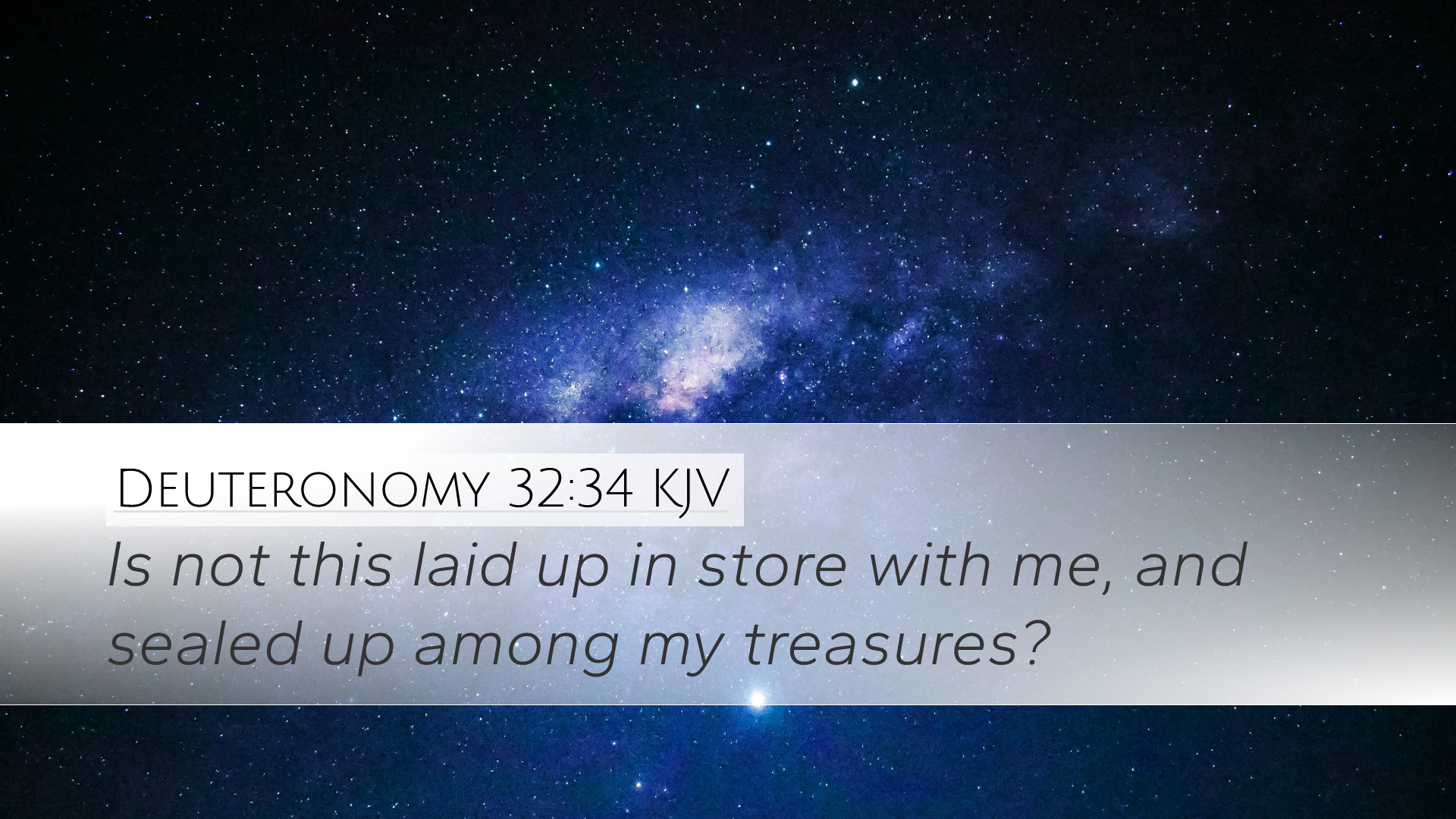Commentary on Deuteronomy 32:34
Deuteronomy 32:34 states: "Is not this laid up in store with me, and sealed up among my treasures?" This verse contains profound theological implications and highlights key themes that are pivotal for biblical understanding and pastoral teaching.
Contextual Overview
This verse is embedded in the context of Moses' song which serves as a farewell address to the people of Israel. It embodies a prophetic declaration concerning God's justice and the certainty of His judgments against His people. Moses articulates the tension between divine grace and judgment, encapsulated in the imagery of God's treasures.
Theological Insights
In the discourse of the nature of God’s retributive justice, this verse conveys that God’s judgments are both inevitable and premeditated. The use of the terms "laid up in store" and "sealed up" suggests two critical aspects:
- Divine Foreknowledge: God’s knowledge of the actions of man and the consequent judgments are not arbitrary but are 'laid up' with full knowledge of the eventual outcomes.
- Preserved Justice: The phrase "sealed up among my treasures" implies that God's judgments are safeguarded, highlighting their security and assuredness.
Commentaries from Notable Scholars
Matthew Henry
Matthew Henry elaborates on this verse by emphasizing the metaphor of God’s treasure. He notes that just as a treasure is protected and valued, so too are God's judgments carefully preserved. Henry reflects that this preservation serves as a warning for the Israelites, underscoring the seriousness of sin and the fidelity of God’s promises and threats. He underscores that God's treasures are not merely material but are divine truths and principles that illuminate His righteous character.
Albert Barnes
Albert Barnes interprets this verse to highlight the security of God's retribution against the backdrop of Israel's apostasy. He notes that the idea that God has stored away His wrath indicates that while God may be patient, His justice will ultimately be executed. Barnes emphasizes that this verse encourages believers to acknowledge that every action and decision is accounted for by God, urging them to live righteously, mindful of God's eventual reckoning.
Adam Clarke
Adam Clarke takes a deeper look at the covenant relationship between God and His people. He remarks that the treasures mentioned in this verse include not only God's judgments but also His provisions and mercy. Clarke suggests that in God's treasury there exists an intricate balance; while God has stored up His wrath against Israel’s disobedience, He simultaneously holds out the hope of mercy. This duality signifies God’s character as loving yet just and invites scholars and students alike to ponder the complexities of divine love and justice.
Applications for Pastoral Ministry
For pastors and church leaders, Deuteronomy 32:34 presents several meaningful applications:
- Encouragement in Judgment: This verse serves as a reminder that God's judgments are not whimsical but founded in deliberation and divine wisdom. Pastors can draw on this when teaching on divine justice, reinforcing that God is not absent in our struggles but is ever overseeing every aspect of our lives.
- Call to Righteous Living: The certainty of God's records invites believers to live with integrity. Pastoral teachings can encourage congregants to pursue holiness, knowing that their actions are stored in God’s memory, highlighting the seriousness of sin.
- Hope in God’s Treasures: The treasures of God's mercy are also vital in this passage. Pastors can emphasize the loving aspects of God's character, teaching that despite the reality of judgment, there is always an avenue of repentance and grace available to those who seek it earnestly.
Conclusion
In conclusion, Deuteronomy 32:34 offers profound insights into the character of God and the nature of His relationship with humanity. It serves as a powerful reminder for believers of both the reality of divine judgment and the incredible grace available through repentance. Engaging with this text through the lens of historical understanding and theological reflection can equip pastors, students, and scholars to communicate God’s message effectively and meaningfully.


